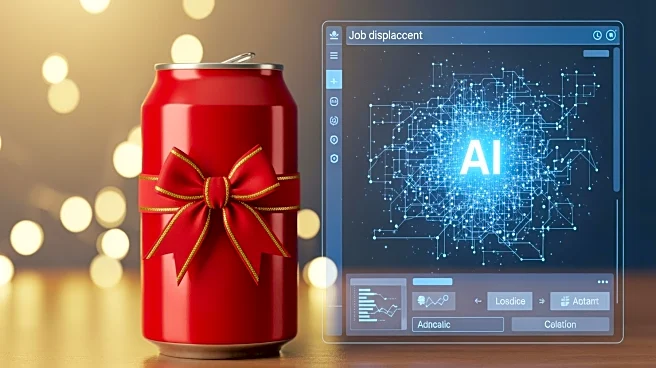What's Happening?
Coca-Cola has released a new holiday advertisement for 2025, created entirely using generative AI, which has sparked significant backlash. The ad, produced by Los Angeles-based AI studio Secret Level,
features iconic elements such as Coca-Cola trucks and Santa Claus, all rendered with AI technology. This marks Coca-Cola's continued investment in AI, following previous AI-generated ads in 2023 and 2024. Despite criticism over the craftsmanship of last year's ad, Coca-Cola's global VP and head of generative AI, Pratik Thakar, claims the new ad's quality is significantly improved. However, the ad has been met with criticism online, with many expressing concerns over job displacement and the authenticity of AI-generated content. Critics argue that the use of AI in such creative endeavors undermines traditional craftsmanship and could lead to job losses in the creative industry.
Why It's Important?
The controversy surrounding Coca-Cola's AI-generated ad highlights the growing tension between technological advancement and job security in creative industries. As companies increasingly adopt AI for content creation, there is a fear that human roles in these sectors may diminish, leading to job displacement. This development raises ethical questions about the balance between innovation and employment. The backlash also underscores a broader societal debate about the authenticity and value of AI-generated content compared to human-created works. Stakeholders in the creative industry, including artists and unions, may need to address these challenges to protect jobs and maintain the integrity of creative professions.
What's Next?
As the use of AI in advertising and content creation continues to expand, companies like Coca-Cola may face increased scrutiny from both the public and industry professionals. There could be calls for regulatory measures to ensure fair labor practices and protect jobs in creative fields. Additionally, the ongoing debate may prompt companies to find a balance between leveraging AI for efficiency and preserving human creativity. The response from industry groups, such as SAG-AFTRA, which has already expressed concerns over AI-generated actors, could influence future policies and practices in the entertainment and advertising sectors.
Beyond the Headlines
The use of AI in creative industries not only impacts employment but also raises questions about intellectual property and artistic integrity. As AI tools become more sophisticated, distinguishing between human and AI-generated content may become increasingly difficult, potentially leading to legal challenges over copyright and ownership. Furthermore, the cultural implications of AI-generated content could shift consumer perceptions of authenticity and value in media and advertising. These developments may necessitate new frameworks for evaluating and regulating AI's role in creative processes.










